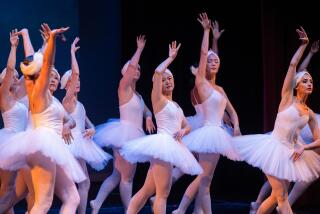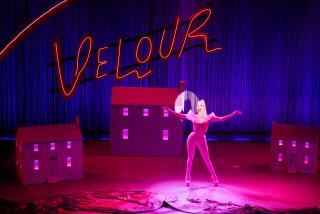MUSCOVITE VAUDEVILLE : BUS AND TRUCK BOLSHOI FROM MOSCOW BALLET
It Was almost like old times, Monday night at the Dorothy Chandler Pavilion. A company of muscular Russian dancers presented a generous--some might say sprawling --evening of high-class vaudeville kitsch.
You know: a scene from this, a duet from that, a show-stopping circus solo here, a little lyrical indulgence there.
You know: unabashed, old-fashioned bravura stuff from behind the distant, glamorous and mysterious Iron Curtain.
You know: lots of leaping and spinning, lots of swooping and sighing, lots of well-dressed and pushy salesmanship.
But it wasn’t like old times.
The clap-happy audience filled less than half the auditorium. The pickets out front lamented no alleged socio-political abuses, just the use of hopelessly sterile tape recordings where we needed a live orchestra. The stage was feebly populated by a company of 30, and cheaply outfitted with primitive lights, spangly curtains, hand-me-down costumes and minimal sets.
This certainly wasn’t the Kirov, though a few of the dancers actually were here courtesy of the elegant Leningrad company.
This certainly wasn’t the Bolshoi, though a few of the dancers did hail from the mighty Moscow company, and the repertory did resemble the flamboyant mixed bills that remain its export speciality.
This was something called the Moscow Ballet, at best a bus-and-truck version of the Bolshoi of yore. That, of course, is a contradiction in terms. Bolshoi means big, grand, ambitious. This company--directed by Vyacheslav Gordeyev, an aging black-sheep danseur - noble in the current Bolshoi regime--is small, unprepossessing, modest.
That would be no problem, of course, if the ensemble were a reasonable facsimile content to do modest things. At home in Moscow, that indeed would seem to be the case.
Gordeyev has said he likes to concentrate on modern challenges, on unusual repertory excursions and stylistic experiments. However, for this debut tour in the United States--a carelessly managed tour that concentrates, probably with good reason, on secondary cities--Gordeyev has been persuaded to serve a banal menu of balletic chestnuts, potboiled.
It may be worth noting, for instance, that the great Shades scene from “La Bayadere,” which opened this program, was added to the repertory specifically for America. That, no doubt, explains the rusty and all too robust corps. It does not explain the prosaic Nikiya of Lubov Kunakova, who had danced a decent “Swan Lake” here with the Kirov, or the rough and unready Solor of Evgeny Amosov.
Matters improved a bit, but not much, in a sprawling potpourri from “Don Quixote” that closed the program. The uncredited scenery looked as if it had been raided from a very dusty warehouse. The costumes resembled Vegas rejects. The supporting roles were left to nondescript hands. The choreography--Gordeyev providing scrambled padding between the predictable Petipa highlights--lacked focus.
Still, one could admire the steely charm of Svetlana Kuznetsova as Kitri, recipient of hasty one-arm lifts from the Basilio of the boss himself. At 39, Gordeyev may lack his erstwhile elevation, but he remains remarkably fleet, fit, dashing and sympathetic. One also could admire the unbridled flash of Kunakova, normally a Kitri but temporarily demoted here to Mercedes.
The inevitable divertissements, some of them leftovers from last week’s stand at Ambassador Auditorium, offered little inspiration.
The strange little interludes began with the exotic vulgarity of the Pas d’Esclave from “Le Corsaire” somnolently executed by Kuznetsova and Gordeyev. This was followed, and not a moment too soon, by the whiz-bang flights of Vadim Pisarev in the inevitable Ukrainian Gopak.
The would-be novelties involved two odd snippets. First came the cornball religiosity of Gordeyev’s “Paganini” in which Igor Mozhukhin played cringing mirror games, peek-a-boo, and, literally, the fiddle, all with the scarlet-clad body of a convenient nemesis, Sergei Andukinov, and all to anachronistic tunes of Handel. For quasi-modern kinetic contrast, Gordeyev provided some athletic tangles for Maria Filipenko and Igor Mikailov in a trite ritual called “Melody of Love.”
Incidental warnings: You can’t tell the players, much of the time, even with a program. And if, by some miracle, you really manage to identify a player, forget about a consistent label. The editors spell virtually no name the same way twice.
Also, do not take the advertising claims regarding repertory seriously. Any similarity between what is promised and what is delivered is, apparently, accidental.
Oh, well. At least the audience doesn’t have to file through metal detectors at the Music Center to get to this ballet.
And some nice things never change. Dwight Grell, that most blessedly cockeyed of terpsichorean optimists, is still tossing glorious bouquets to anything that happens to look Russian and happens to move.
More to Read
The biggest entertainment stories
Get our big stories about Hollywood, film, television, music, arts, culture and more right in your inbox as soon as they publish.
You may occasionally receive promotional content from the Los Angeles Times.










